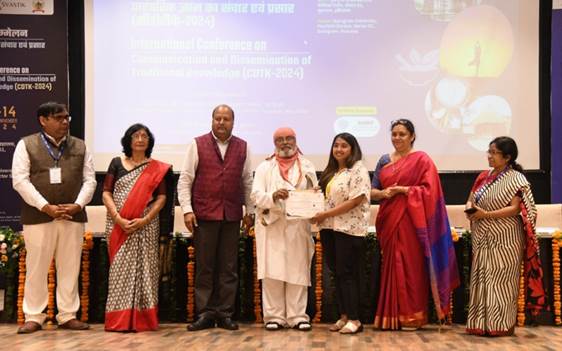Gurugram: The International Conference on Communication and Dissemination of Traditional Knowledge (CDTK-2024), jointly organized by CSIR-National Institute of Science Communication and Policy Research (NIScPR) and Gurugram University, concluded on a high note. Held over two days at Gurugram University, the event highlighted the fusion of traditional wisdom with modern science to address contemporary challenges.
The opening day saw diverse sessions focusing on themes such as traditional pedagogies in education, ethics in traditional knowledge research, and scientific perspectives on agriculture and cuisine. Workshops like Paramparik Gyan Sanchar: SVASTIK explored effective communication methods for disseminating traditional knowledge.
Experts also discussed the integration of ancient sciences into modern disciplines and the sustainability of traditional architecture, setting the stage for a comprehensive exploration of India’s cultural and scientific heritage.
The second day delved deeper into traditional knowledge and its application.
In the Arogya Vidya session, chaired by Prof. Bhushan Patwardhan, National Research Professor-AYUSH, speakers emphasized patient-centric healthcare, evidence-based frameworks, and the integration of AYUSH systems. Dr. Rabinarayan Acharya, DG, CCRAS, advocated for inclusive healthcare practices, while Dr. N. Zaheer Ahmed, DG, CCRUM, focused on drug quality and traditional remedies.
Dr. Virendra M. Tiwari, Director, CSIR-NEIST, chaired the session on Jal, Paristhitiki Evam Paryavaran, which addressed traditional ecological knowledge and sustainable practices. Prof. Saroj K. Barik, NEHU Shillong, highlighted bamboo management and sacred groves’ cultural importance. Prof. Sharad Jain, former Director of the National Institute of Hydrology, traced India’s hydrologic advancements to ancient texts like the Rig Veda and Arthashastra.
The session on ancient healing traditions featured discussions on Yoga, Homeopathy, and Sowa Rigpa. Speakers like Dr. Sunil S. Ramteke and Dr. Padma Gurmet emphasized these systems’ therapeutic potential, particularly in stress management and Himalayan health practices.
A panel discussion led by Prof. Vibha Tripathi, Former Head of BHU, focused on validating traditional knowledge. Prof. Rama Jayasundar from AIIMS outlined the importance of evidence-based research, while Dr. Rabindra N. Padariya from IARI stressed the need for interdisciplinary collaboration and community validation.
The valedictory session was marked by gratitude and recognition. Prof. Ranjana Aggarwal, Director of CSIR-NIScPR, welcomed the participants and the Chief Guest, Padma Bhushan Prof. Anil P. Joshi of HESCO, Dehradun.
Prof. Joshi emphasized preserving India’s cultural heritage while navigating global influences, urging harmony between traditional knowledge and modern science. Awards for best poster presentations were distributed, highlighting the contributions of young researchers.
Prof. Dinesh Kumar, Vice Chancellor of Gurugram University, stressed the urgency of sustainability, noting that material progress alone cannot mitigate environmental challenges.
The conference brought together over 400 delegates, showcasing poster and oral presentations that reflected the depth and diversity of research in traditional knowledge. Dr. Charu Lata summarized the deliberations, while Dr. Dhirender Kaushik of Gurugram University expressed gratitude to the dignitaries and participants, emphasizing the collaborative efforts that ensured the event’s success.
CDTK-2024 not only celebrated India’s rich traditional knowledge systems but also reinforced their relevance in building a sustainable and inclusive future. The conference stands as a testament to the power of collaboration in bridging the past and present for a better tomorrow.





